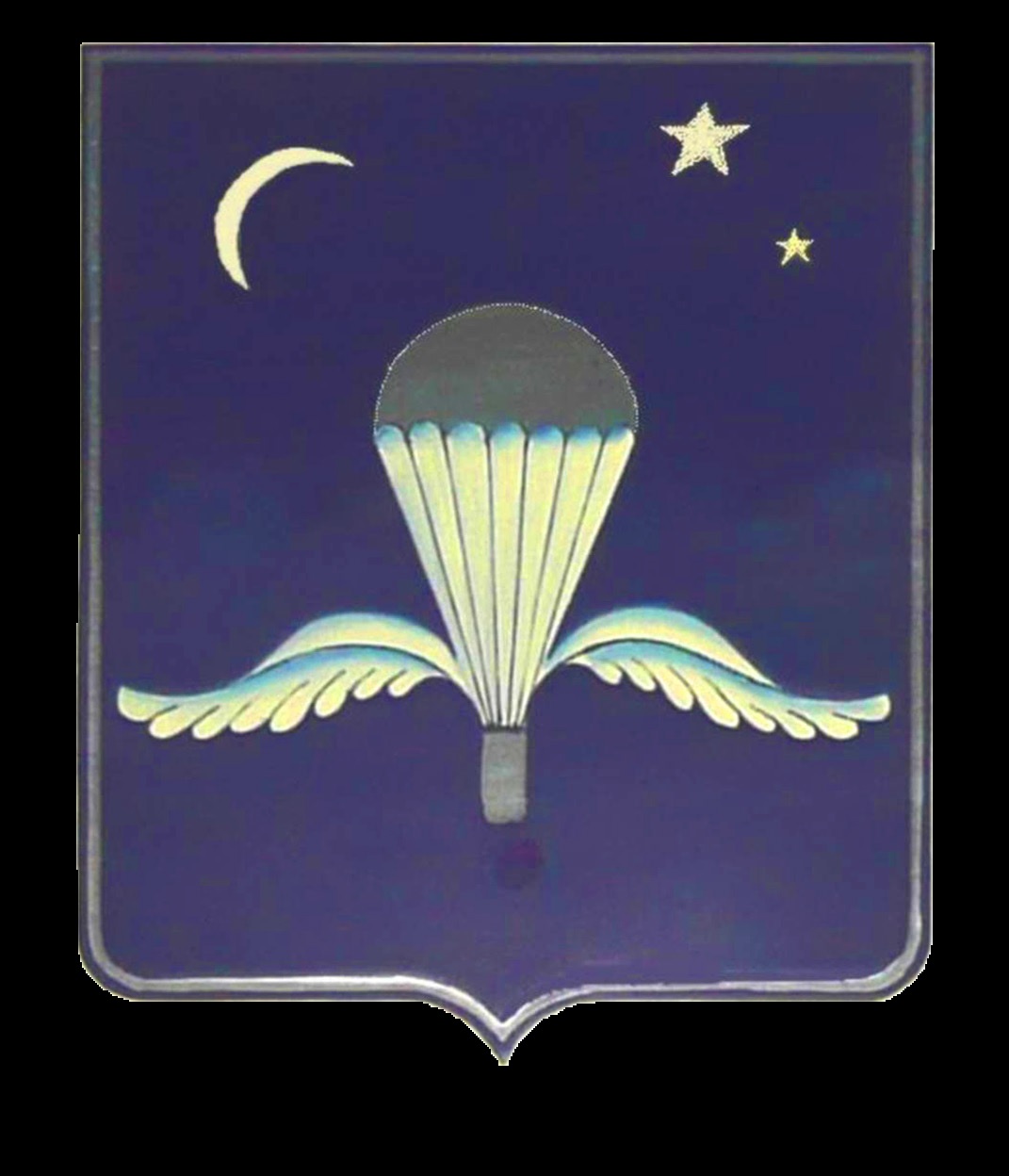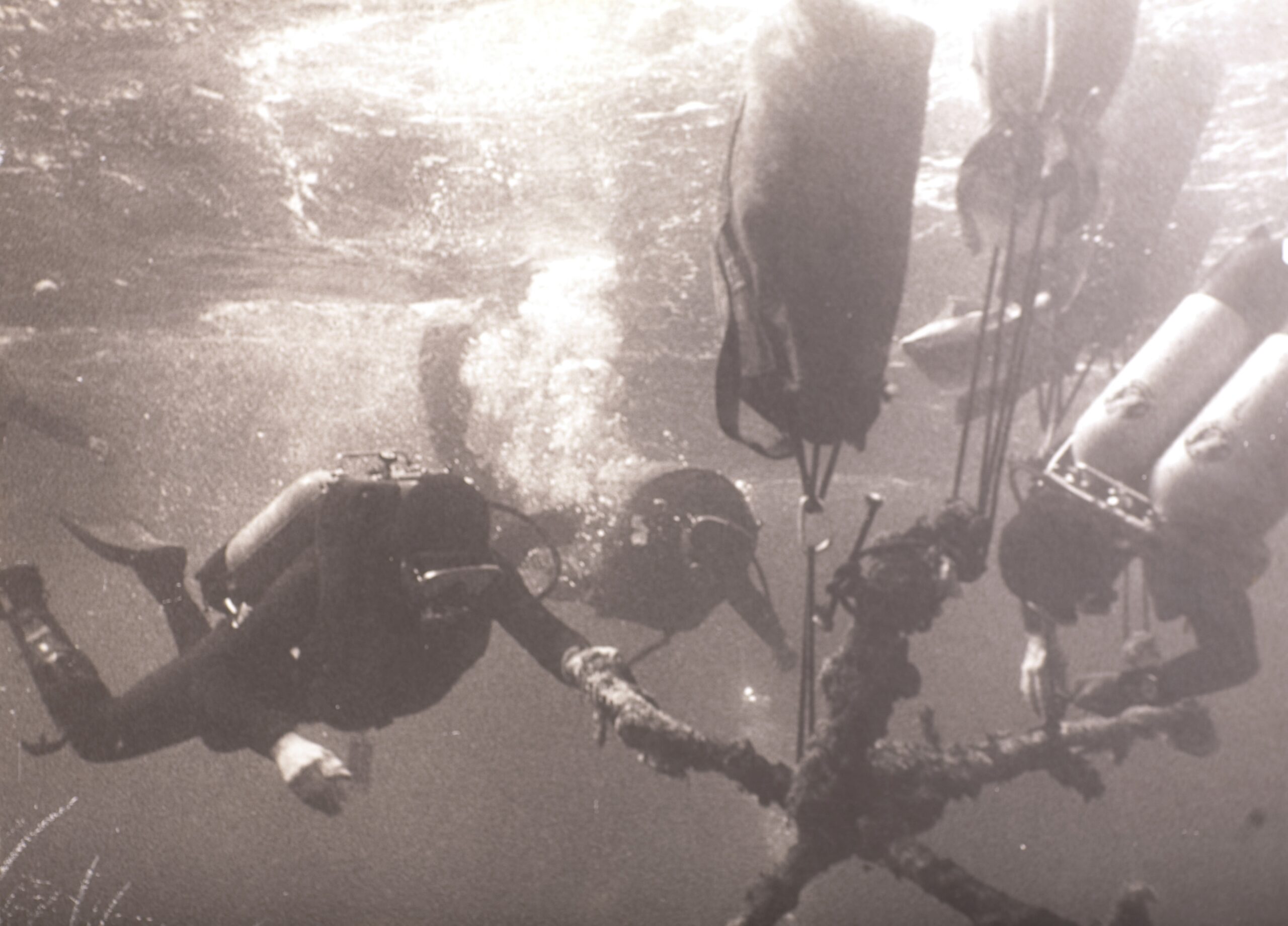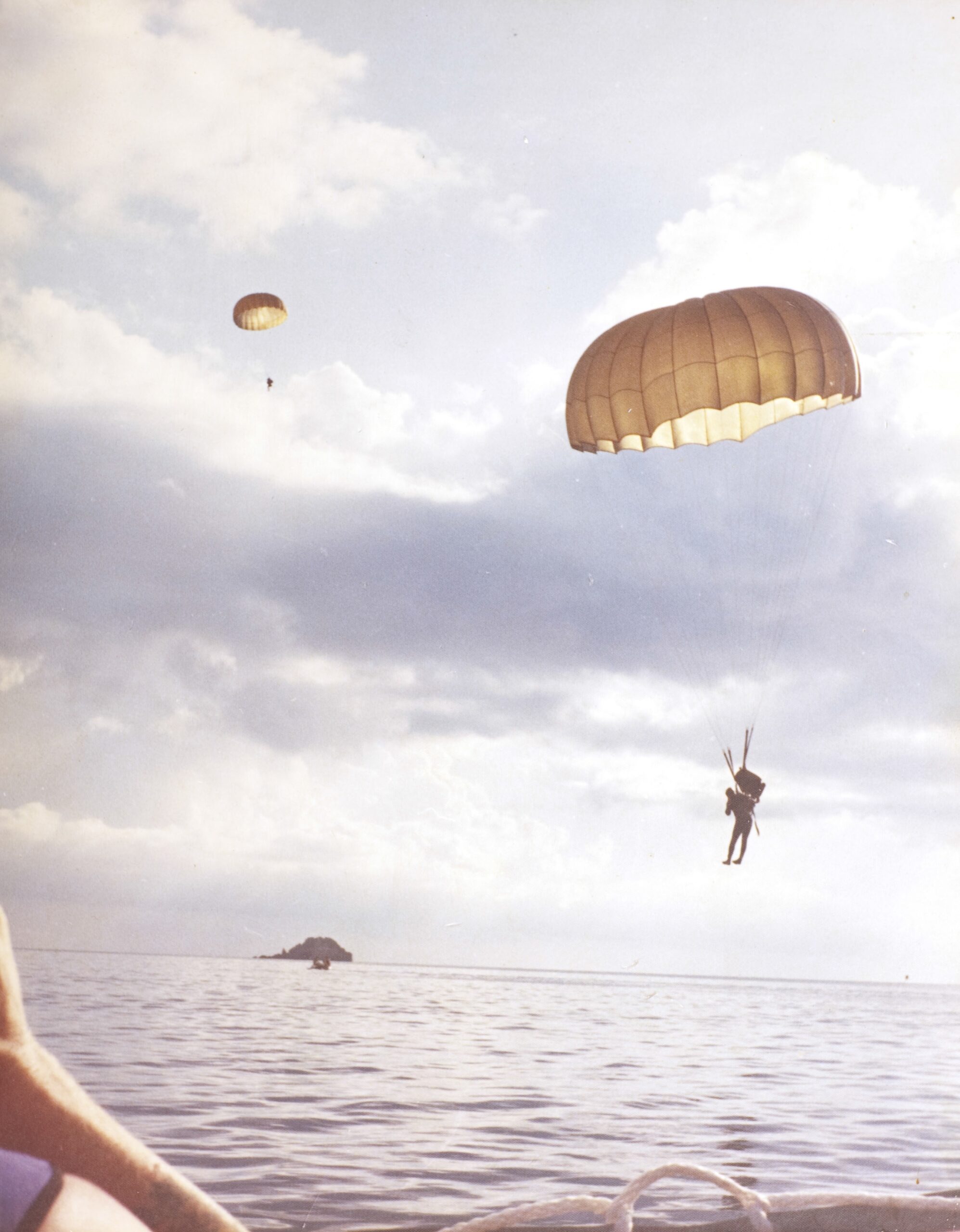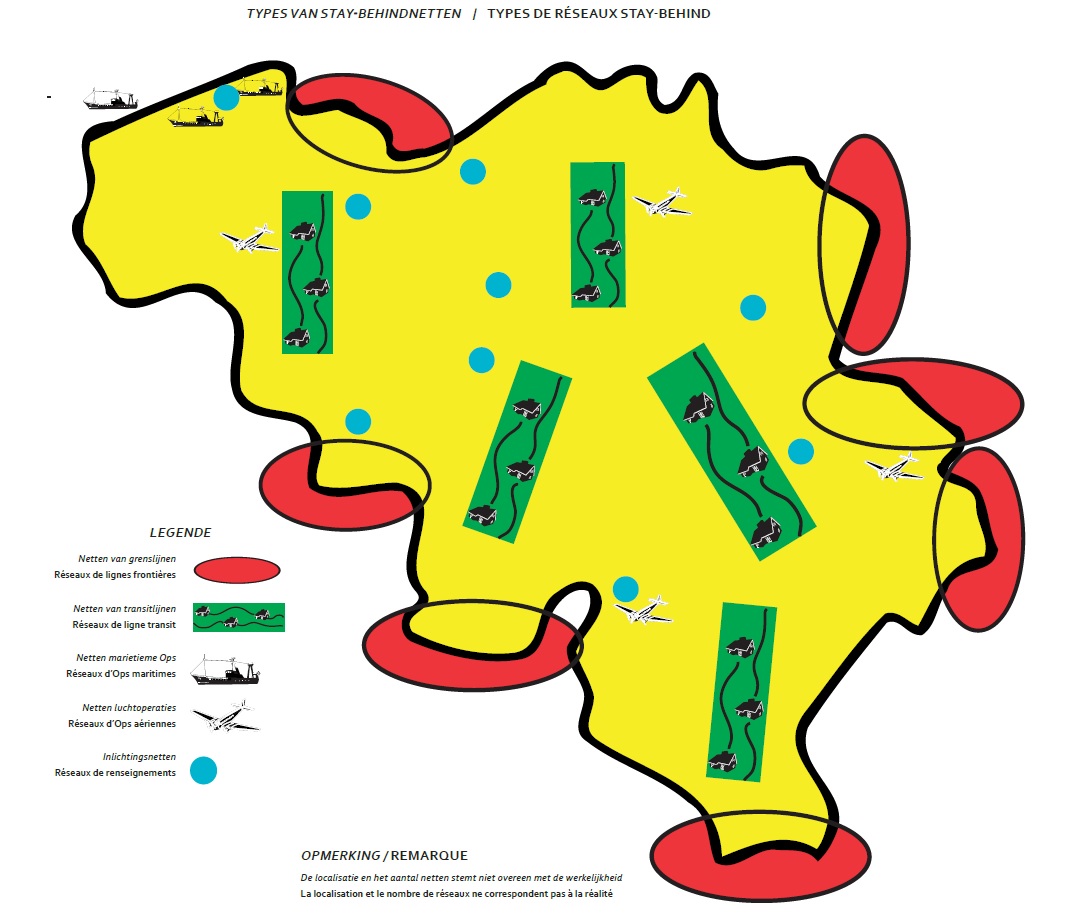| Previous page | Back to exhibition’s homepage | Next page |
 | SDRA VIII – STAY BEHIND |
| Contents: 1. Introduction 2. Missions 3. Recruiting 4. Training 5. The action section |
|
|
|
| Na de Tweede Wereldoorlog wordt de “Service de Documentation de Renseignement et d’Action VIII” (SDRA VIII) opgericht. | After the Second World War, the “Service de Documentation de Renseignement et d’Action VIII” (SDRA VIII) was established. | Après la Seconde Guerre mondiale, le Service de Documentation de Renseignement et d’Action VIII (SDRA VIII) est fondé. |
| Dit stay-behind netwerk moet ervoor zorgen dat, in geval van een gewapend conflict en bezetting van het Belgisch grondgebied, de Belgische regering kan uitwijken naar een veilig toevluchtsoord en in contact kan blijven met de achterblijvers. | In the event of an armed conflict and the occupation of Belgian territory, this stay-behind network had to enable the Belgian government to evacuate to a safe haven and to maintain contact with those who stayed behind. | En cas de conflit armé et d’occupation du territoire belge, ce réseau « stay-behind » doit faire en sorte que le gouvernement belge puisse s’exiler en lieu sûr et maintenir le contact avec ceux restés au pays. |
| Aan het einde van de Tweede Wereldoorlog hebben de inlichtingennetwerken met heel wat problemen te kampen: verraders, weinig of niet-getrainde agenten en vele slachtoffers. | At the end of the Second World War, the intelligence networks faced numerous problems: traitors, little or not trained agents, and many victims. | Au lendemain de la Seconde Guerre mondiale, les réseaux de renseignement sont confrontés à maints problèmes : traîtres, agents peu ou pas formés et nombre de victimes. |
| Na 1945 wordt de dreiging van een nieuw conflict steeds reëler en de eerste tekenen van de Koude Oorlog worden zichtbaar met de Praagse Coup (februari 1948) en de Blokkade van Berlijn (maart 1948-mei 1949). | After 1945, a new conflict threatened to materialise and the early stages of the Cold War became apparent, as illustrated by the Czech Coup (February 1948) and the Berlin Blockade (March 1948-May 1949). | Après 1945, la menace d’un nouveau conflit se matérialise de plus en plus, et les prémices de la guerre froide apparaissent, comme en témoignent le Coup de Prague (février 1948) et le Blocus de Berlin (mars 1948-mai 1949). |
| In januari 1949 ontvangt eerste minister Spaak een brief van het hoofd van de Britse Secret Intelligence Service, Stewart Menzies, met de vraag om samen te werken aan de oprichting van een verzets- en spionagenetwerk. Spaak stelt als voorwaarde dat de Verenigde Staten van Amerika in het project worden betrokken: “Het zou zeer wenselijk zijn dat de drie diensten nauw samenwerken… Ik meen dat het dus onontbeerlijk is dat op het hoogste niveau onderhandelingen worden gevoerd tussen Londen en Washington om dat vraagstuk te regelen”. | In January 1949, Prime Minister Paul-Henri Spaak received a letter from the head of the British Secret Intelligence Service, Stewart Menzies, who asked him to collaborate in the creation of a resistance and spy network. Spaak set the condition that the USA should take part in the project: “It would be very desirable that the three services work closely together… I therefore deem vital that negotiations are conducted at the highest level between London and Washington in order to address the issue.” | En janvier 1949, le Premier ministre Paul-Henri Spaak reçoit une lettre du chef des services secrets britanniques, Stewart Menzies, qui lui demande de collaborer à la création d’un réseau de résistance et d’espionnage. Spaak pose comme condition la participation des États-Unis. « Il serait plus que souhaitable que les trois services travaillent en étroite collaboration… J’estime qu’il est dès lors indispensable que des négociations soient menées au plus haut niveau entre Londres et Washington afin de régler la question. » |
| De eerste stappen naar de oprichting van een Belgisch stay-behind netwerk zijn daarmee gezet en de oorspronkelijke opdrachten worden vastgelegd. | The first steps to the establishment of a Belgian stay-behind network were made and the initial missions were determined. | Les premiers jalons de la création d’un réseau stay-behind belge sont donc posés et les premières missions sont définies. |
Opdrachten | Missions | Tâches |
| De oorspronkelijke opdrachten zijn: – inlichtingen verzamelen (operational clandestine intelligence): sommige agenten hebben in vredestijd de opdracht om bepaalde inlichtingen voor te bereiden. Dit gaat veelal om informatie betreffende de economische situatie. – escape and evasion: andere agenten zijn verantwoordelijk voor het evacueren van neergehaalde piloten en eigen agenten die verraden zijn. – “action”: sabotage van militaire objectieven, het organiseren van het verzet. – contra-information. | The original missions of SDRA VIII consisted in: – intelligence collection (operational clandestine intelligence) : in peacetime, some agents had to prepare intelligence. It mainly concerned information pertaining to the economic situation. – escape-and-evasion tasks: some agents were responsible for the exfiltration of shot-down pilots and betrayed agents. – actions: sabotage of military objectives, organization of the resistance, etc. – counter-information. | Initialement, les tâches du SDRA VIII consistaient en : – la collecte de renseignements (renseignement clandestin opérationnel) : en temps de paix, certains agents devaient documenter des renseignements déterminés. Il s’agissait principalement d’informations concernant la situation économique. – des missions dites « escape and evasion » : des agents étaient chargés de l’exfiltration de pilotes descendus et d’agents démasqués. – des actions précises : sabotage d’objectifs militaires, organisation de la résistance, etc. – la contre-information. |
| Vanaf 1959 worden de missies aangepast. De missies betreffende “action” worden niet langer uitgevoerd en de nadruk wordt gelegd op het inwinnen van inlichtingen. | As from 1959, the missions of SDRA VIII were modified. Action missions were abandoned in order to focus on intelligence collection. | Dès 1959, les tâches du SDRA VIII sont modifiées. Le service ne réalise plus de missions de type « action » et se concentre sur la collecte de renseignements. |
Rekrutering | Recruiting | Recrutement |
| De personen die in aanmerking komen als agent moeten van onberispelijk gedrag zijn. De voorkeur gaat uit naar personen van ongeveer 40 jaar met een vaste betrekking. De rekruteringsofficieren trachten ook discrete kandidaten op te sporen met een groot nationaal gevoel en ze mogen niet aangesloten zijn bij een politieke organisatie. | The future agents must demonstrate irreproachable behaviour. They are preferably people aged about 40 who have stable employment. The recruiting officers also try to pinpoint candidates with a strong national sentiment who are not affiliated with a political organisation. | Les candidats à la fonction d’agent doivent faire preuve d’un comportement irréprochable. Il s’agit de préférence de personnes d’environ 40 ans avec un emploi stable. Les officiers de recrutement essayent également de repérer des candidats discrets, dotés d’un profond sentiment national, et qui ne sont pas membres d’une organisation politique. |
| De rekrutering van een agent gebeurt op vrijwillige basis. Er wordt geen overeenkomst ondertekend en er wordt geen financiële vergoeding toegekend. De basis is vertrouwen. De agenten hebben enkel contact met hun instructeur en opereren in quasi totale anonimiteit. | The recruitment of an agent occurs on a voluntary basis. No contract is signed and no financial compensation is granted. The relations are based on trust. The agents have contacts only with their instructor. They operate in almost total anonymity. | Le recrutement d’un agent se fait sur base volontaire. Aucun contrat n’est signé et aucune compensation pécuniaire n’est attribuée. Tout est basé sur la confiance. Les agents n’entretiennent des contacts qu’avec leur instructeur. Ils opèrent dans un anonymat quasi total. |
| De agenten kunnen op elk ogenblik beslissen uit het netwerk te treden. | The agents can decide to leave the network anytime. | À tout moment, les agents peuvent décider de quitter le réseau. |
Opleiding | Training | Formation |
| De agenten krijgen een opleiding gericht op hun taak bij een eventuele bezetting van het land. Dit kan het inwinnen en doorgeven van inlichtingen zijn aan de Belgische regering in ballingschap of het opvangen en evacueren van personen (‘escape and evasion’). Daarnaast krijgen zij ook een algemene opleiding in inlichtingenwerk (de veiligheidsprincipes en –procedures), en het opsporen en afschudden van achtervolgers. De opleiding gebeurt individueel, de kandidaten hebben geen contact met elkaar. | The agents’ training focuses on their tasks in the event of the occupation of the country. Their missions can be related to the collection and transmission of intelligence to the Belgian government-in-exile, or to the exfiltration of persons (escape and evasion). Moreover, they receive general training in tradecraft (security principles and procedures), and methods to identify and shake off tails. The training is individual; the candidates have no contacts with each other. | La formation des agents met l’accent sur leurs tâches en cas d’occupation du territoire. Il peut s’agir de la collecte et de la transmission de renseignements au gouvernement belge en exil ou de la prise en charge et de l’exfiltration de personnes (escape and evasion). Par ailleurs, ils reçoivent une formation générale axée sur les techniques de renseignement (principes et procédures de sécurité), ainsi que sur la manière de repérer et de semer des poursuivants. La formation se déroule de manière individuelle ; les candidats n’ont aucun contact entre eux. |
De sectie actie | The action section | La section action |
| Bij elk netwerk dat in het geheim moet opereren, is een dekmantel (of couverture) uitermate belangrijk. Een dekmantel zorgt ervoor dat de ware aard van iemand of iets verborgen blijft voor buitenstaanders. | Each network that operates confidentially absolutely needs a cover. A cover allows to hide the true identity of an individual or the true nature of an object from outsiders. | Chaque réseau qui opère dans la confidentialité se doit à tout prix de travailler sous couverture. Cette couverture permet de cacher aux non-initiés la véritable identité d’une personne ou la véritable nature d’une chose. |
| Het personeel van SDRA VIII gebruikt de benaming ‘sectie Actie’ als dekmantel voor hun netwerk. | The SDRA VIII personnel uses the cover “ Action section” to talk about their network. | Ainsi, le personnel du SDRA VIII utilise l’appellation « section Action » pour parler de leur réseau. |
| Onder de dekmantel van een sectie die belast is met speciale opdrachten in geval van conflict, kunnen ze hun oefeningen en trainingen uitvoeren zonder argwaan te wekken. De trainingen en oefeningen bestaan o.a. uit gevechtszwemmen, nachtelijke parachutesprongen en het droppen van personeel en materieel achter vijandelijke linies. Tijdens de oefeningen werken ze nauw samen met eenheden van het Belgische Leger, zoals het regiment Para-Commando, en kunnen ze gebruik maken van de logistieke steun en knowhow van Belgische eenheden zonder te worden ontmaskerd. Zelfs het personeel van SGR kent de ware aard niet van deze sectie. | Under the cover of a section that is responsible for special missions in case of conflict, they can carry out their exercises and training without arousing suspicion. The training consists of combat swim, night parachute jumps, and air drops of personnel and material behind enemy lines. During the exercises, they closely work with other units of the Belgian Army, for instance with the Para-Commando Regiment, and can use the logistical assistance and know-how of Belgian units without getting exposed. Even the SGR personnel ignore the true nature of this section. | Sous la couverture d’une section chargée d’opérations spéciales en cas de conflit, ils peuvent effectuer leurs exercices et entraînements sans éveiller de suspicions. Les entraînements consistent notamment en de la natation de combat, des parachutages nocturnes et le largage de personnel et de matériel derrière les lignes ennemies. Lors des exercices, ils travaillent en étroite collaboration avec d’autres unités de l’Armée belge, par exemple avec le Régiment Para-Commando, et peuvent utiliser le soutien et le savoir-faire logistiques d’unités belges sans se faire démasquer. Même le personnel du SGR ne connaît pas la vraie nature de cette section. |
| Ook op internationaal gebied gebeuren de trainingen onder de dekmantel van een internationale oefening. | At international level, the training also takes place under the cover of an international exercise. | Sur le plan international, les entraînements se déroulent également sous la couverture d’un exercice international. |
 |  |
| Previous page | Back to exhibition’s homepage | Next page |
